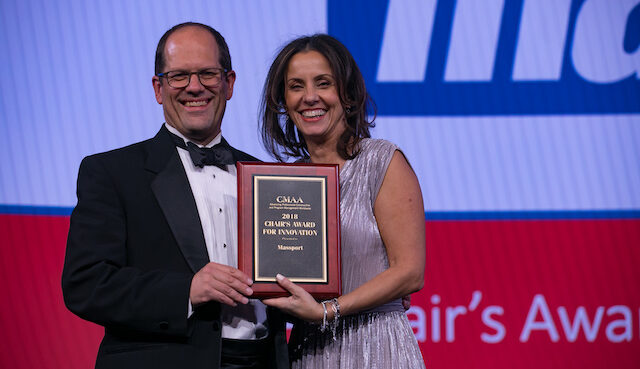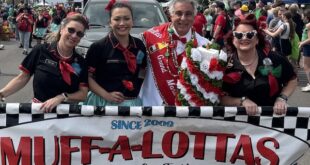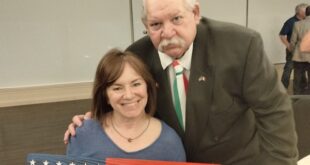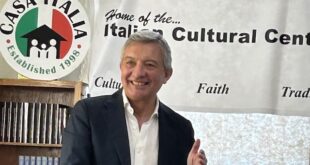Approaching architecture with heart as well as smarts, Luciana Burdi he crafts airport spaces that soothe the soul while they hasten you on your way.
Most of us don’t think of buildings beyond their mere function. Whether they’re made of steel, stone, concrete or glass, they provide us with places to live, learn, work, heal and have fun, and that’s about it, right? But have you ever considered how buildings can flow with us, taking us from stress to rest while getting us from point A to point B?
Dr. Luciana Burdi has. As the deputy director of capital programs and environmental affairs at the Massachusetts Port Authority, she always asks how airports can transport us emotionally as well as physically. No high-flying daydream this. Her talent for turning vision into reality netted her a Women in Design Award of Excellence in 2019, and her indomitable Italian spirit earned her a Lifetime Achievement Award from the Cegliesi Italo-American Association in 2015.
Burdi takes her job very seriously, but not so much herself. In a conversation brightened by laughter and self-deprecation, she took Lou&A on a journey that began in Italy — with a young woman who hated learning English — and led to a remarkable life and career in America.
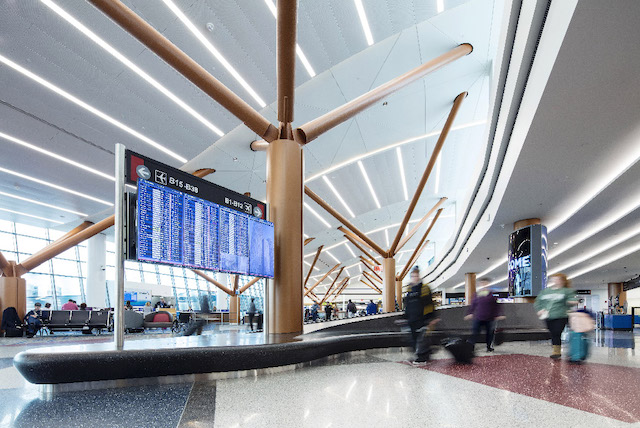
Lou&A: So let’s get this straight: You actually flunked English before coming to America?
Dr. Luciana Burdi: Yes, I failed my English classes in middle school. Really, I did not like English. Then I told my parents I wanted to come here, and they asked, “Are you sure?” But I was in love with the movies, the TV shows — ”Magnum P.I.” (Laughs.)
I came to the U.S. to study when I was 26, not knowing a word of English. I had to work for a year to learn the language before applying to schools. But to me, it was indispensable in advancing my career. I wouldn’t have the position I have now if I weren’t in America. It’s still the land of opportunity, just as it was for previous generations of immigrants, so I’m grateful to America for the opportunities.
Lou&A: You’re proud of your Italian roots, too. Tell us about those.
Burdi: My mother, Gabriella Lorenzelli, is from Pontremoli, a province of Massa-Carrara in Toscana. My father, Michelangelo Burdi, is from Ceglie del Campo, where I was born, in the province of Bari in Puglia. I grew up in Puglia until I was 18 and went to study architecture in Venice, but I spent 50 percent of my summer with my mother’s mother in Toscana. Most of my mother’s family is spread all over. My father came from a family of eight and my mother a family of six — so we had a lot of relatives, and I loved it. I am very, very proud to be Italian. My husband says I have to tell people I’m from Italy, not just an Italian American.
Lou&A: What made you decide to pursue architecture as a calling?
Burdi: My mother was a physical education teacher, and in a similar way, I’m in the public sector because she instilled that sense of giving back.
My father was an engineer, but I was never strong in math. Thank God for calculators. (Laughs.) From the time I was little, he always brought me to job sites. I was fascinated by buildings, by tangible things. I told my father I wanted to go to architectural school, but there were none in Bari, so I went to Venice. Venice is a major city on a very human scale; there are no cars there. I was so fascinated by the architecture and the idea of trying to build something that lasts.
Lou&A: Remarkably, you tackled English well enough to earn a master’s degree at MIT and a doctorate at Harvard. But it was a stop in Chicago that set the stage for that.
Burdi: After Venice, I wanted to live with my cousins in Chicago, Maria and Vito Del Zotti. They opened their home and hearts to me. It was originally intended to be a brief visit to learn English, but I stayed a year. When I decided to pursue my education, I went to Boston to visit another cousin. That’s when I applied to MIT. I fell in love with Boston, and with my husband, the reason I stayed!
Lou&A: There’s a human dimension to all of your architectural work. One of your earlier projects illustrates that beautifully.
Burdi: I’m very proud of the work I did on a female correctional center. My mother taught at a low-income school, so I got to see how people who are underrepresented live. For people in a correctional facility — especially women — there are fewer programs, and they are less considered. It’s about understanding the process of building a building that works for the people who use it, not just creating a structure.
Lou&A: Take us through the work you’ve done with Boston Logan International Airport.
Burdi: With an airport, it’s about the flow of people. Something I instituted is the Passengers Ready Team walkthrough just a few weeks before we open a structure to the public. I take people unfamiliar with the project through it to make sure things make sense intuitively and they don’t get confused or turned around. I mean, I still get lost in my own garage, so this process is very important to me. (Laughs.)
Lou&A: The work goes further than that, right?
Burdi: It’s looking at things from the passenger perspective. In every new women’s bathroom, there’s a Refresh Bar: a counter with plugs and a very big mirror. When we have to put on our makeup, in front of the sink is the worst place to do it because it’s wet and people are waiting behind you. Even the men loved the idea, and we are installing those in their bathrooms, too.
Logan is the living room of every passenger, and pre-COVID, we had more than 42 million passengers. So with the furniture, we look for a material that lasts long and looks nice. If it doesn’t hold up, it’s gone. But if something is durable and doesn’t feel right, that’s not good either. We try to integrate resiliency with comfort.
Lou&A: Your Catholic faith plays a big role in your life and work.
Burdi: From kindergarten to the last year of high school, I was in a Jesuit school — pretty strict. (Laughs). But without my faith, I wouldn’t have been able to handle my mother’s death 10 years ago. It’s a place where I know I can find peace. I tell my husband that a lot of people spend money to go to counseling. Well, church is my counseling, and it’s free! (Laughs.) I wouldn’t be where I am without my parents, my education and my faith.
The above appears in the October 2020 issue of the print version of Fra Noi. Our gorgeous, monthly magazine contains a veritable feast of news and views, profiles and features, entertainment and culture. To subscribe, click here.
 Fra Noi Embrace Your Inner Italian
Fra Noi Embrace Your Inner Italian


